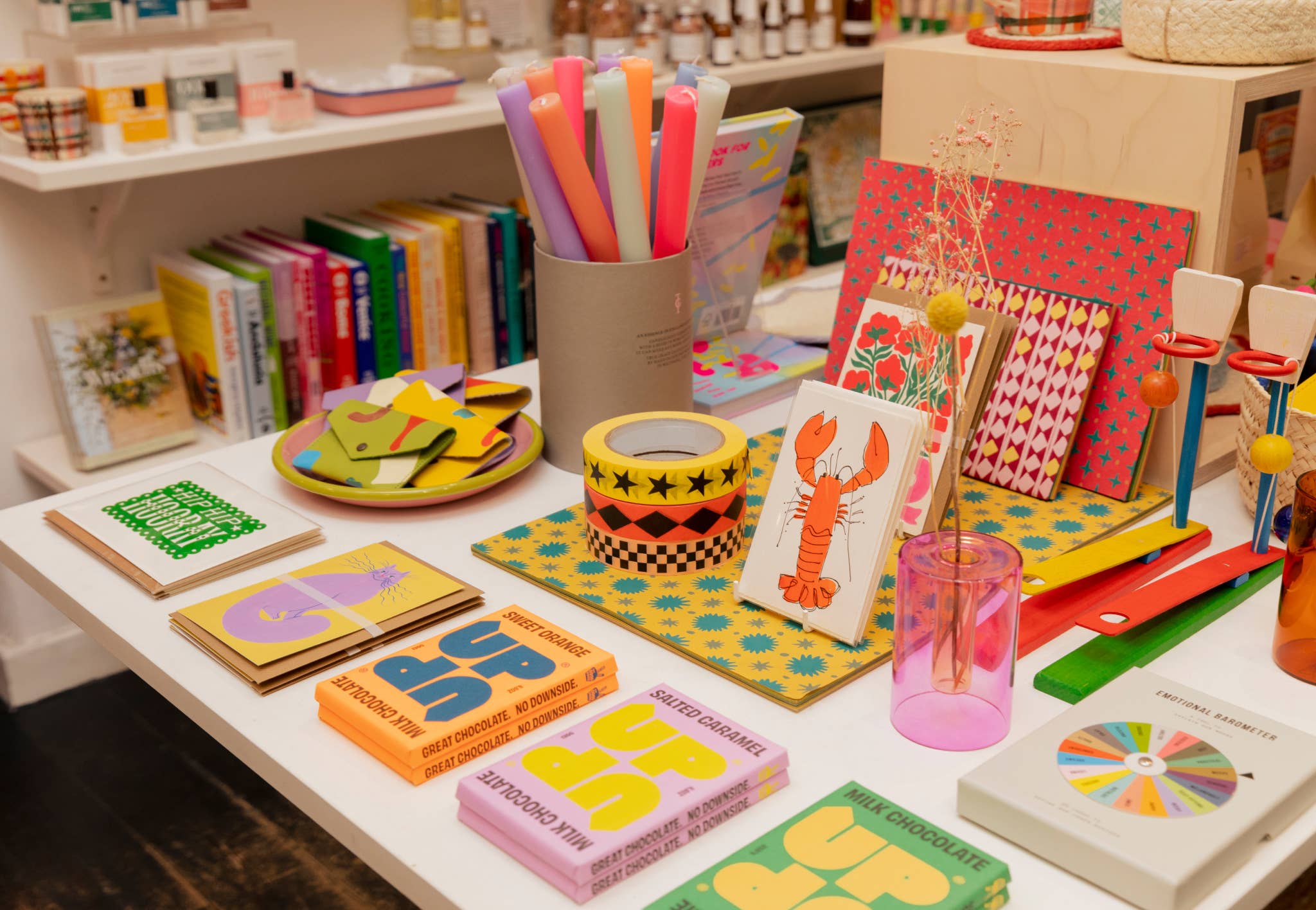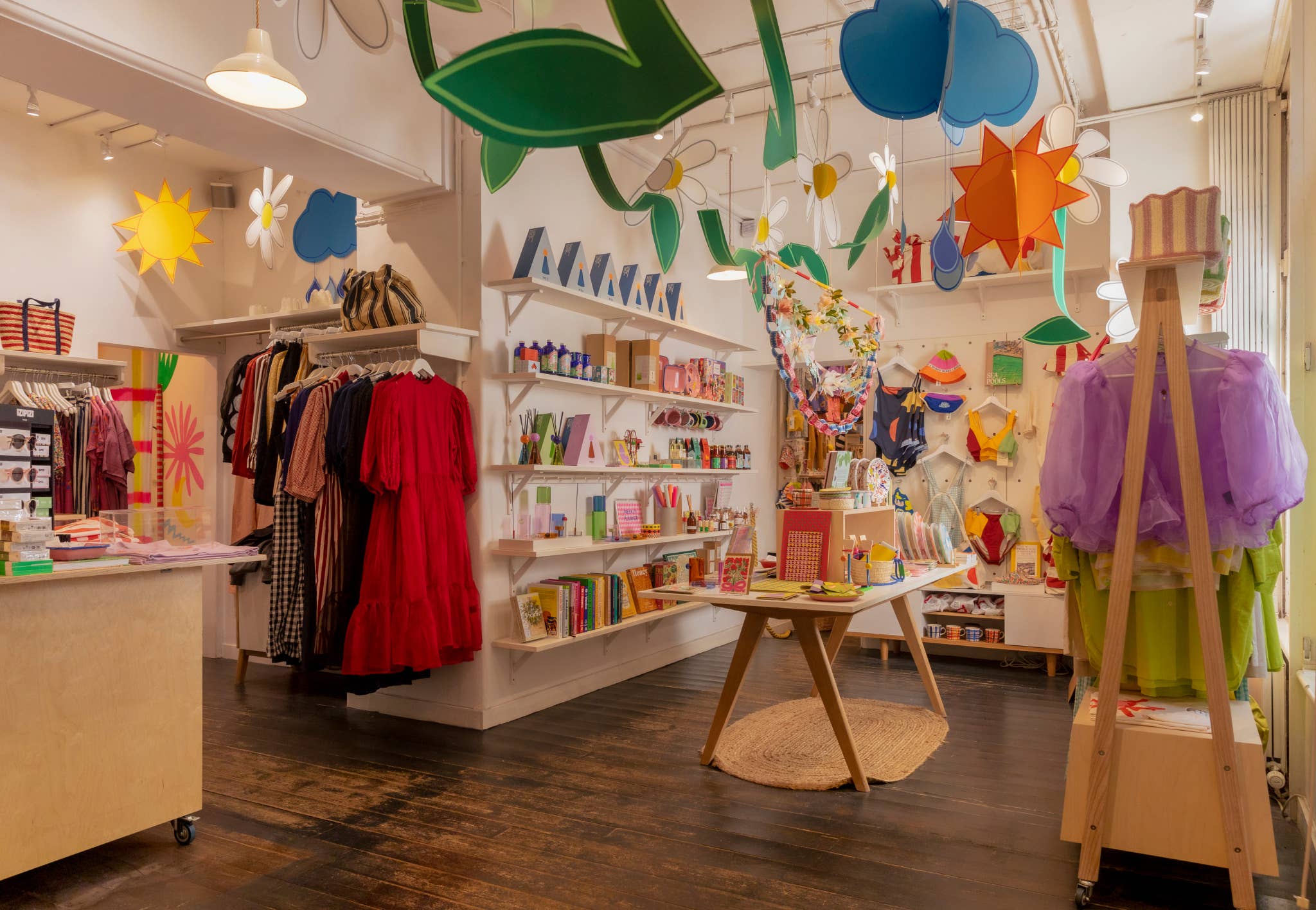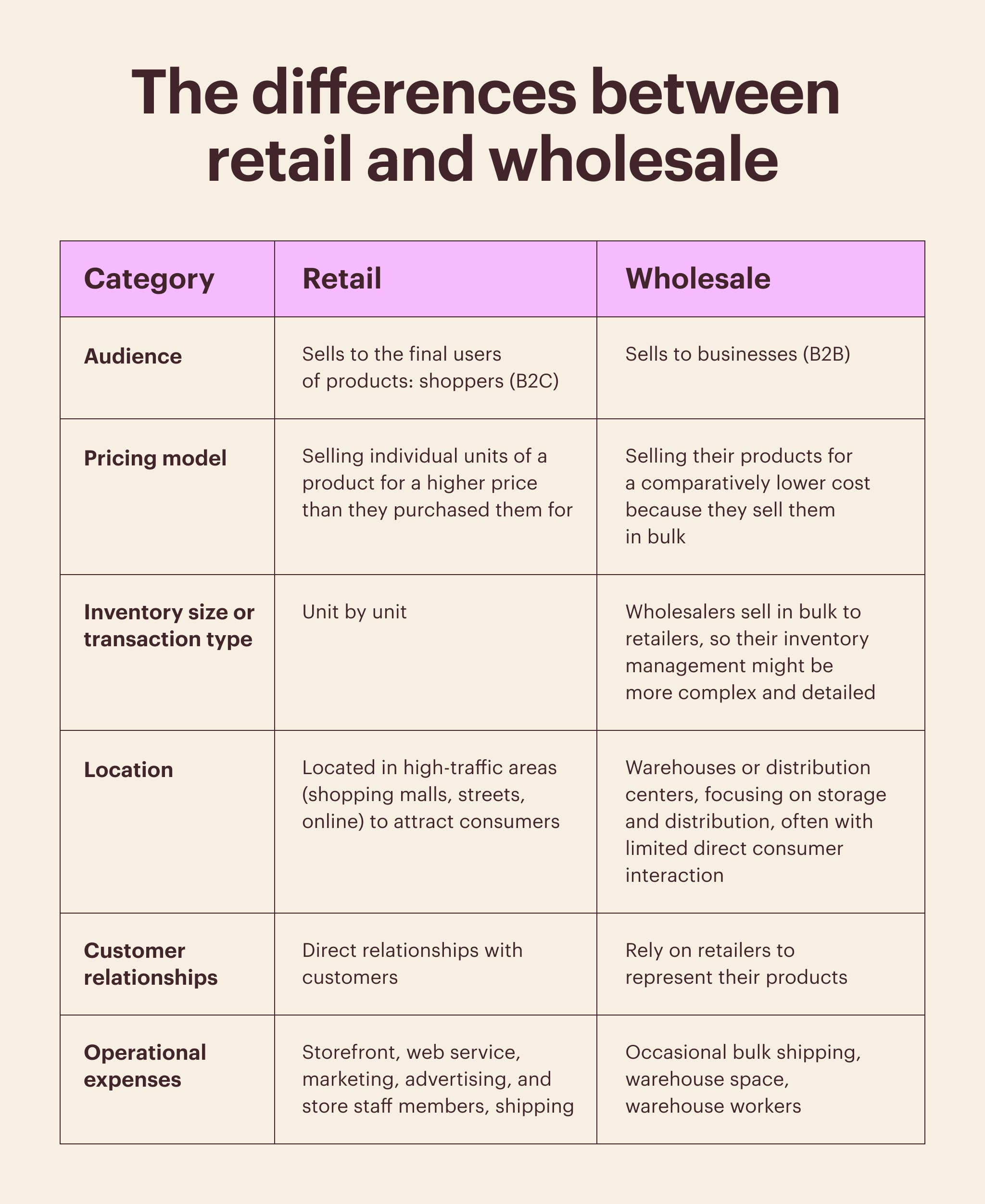
You have a new product. You know you want to sell it, but you’re not sure which market to bring it to. Do you want to sell large quantities of it to stores as a wholesaler? Or do you want to sell smaller quantities directly to shoppers as a retailer?
Each selling method has advantages and important factors to consider—including your own specific business goals. The choice between selling wholesale and retail can determine much of your business model, so we’ve made this guide to help you choose where to begin.
What is wholesale?
First, brands should understand what wholesale is. To put it simply, retailers buy their goods from wholesalers. A wholesaler makes or obtains products in bulk and sells them to retail shops which then sell them to shoppers.
Wholesalers typically store goods in a warehouse or studio until they’re ready to be shipped to buyers. They play an important role in the supply chain since retailers depend on them for products.
What are the different types of wholesalers?
There are many different types of wholesalers out there—and what they actually own, their operations, and where they are in the supply chain can vary greatly between types. Take Faire, for example; we’re a wholesale marketplace that connects manufacturers, makers, wholesalers, and retailers.
Here are some other types of wholesalers you might come across:
Manufacturers: Manufacturers can also set up their own wholesale operations. In this case, they’ll create the goods and distribute the goods directly to retailers and businesses.
Specialized wholesalers: As the name suggests, specialized (or specialty) wholesalers are focused on—and have deep knowledge and expertise in—a specific product category. For instance, they might sell only pharmaceuticals or only Italian pantry ingredients. A good example is Droppe, a European wholesaler specializing in workwear and safety shoes, which connects workwear manufacturers directly with retailers, and by extension, customers.
Dropship wholesalers: What separates dropship wholesalers apart is that they don’t actually operate with any physical inventory. Instead, they take orders from buyers and send them to wholesalers (or manufacturers), who then ship the items directly to the customer. Think of them as a wholesale order middleman.
Cash-and-carry wholesalers: Cash-and-carry wholesalers allow customers to pay in full at the time of purchase and then transport the goods themselves. (In other words, on a cash-and-carry basis.) This strategy means that wholesalers and buyers don’t need to deal with delivery services or lines of credit.

What is retail?
Retailers sell products directly to shoppers, be it online, in brick-and-mortar stores, or both. This includes clothing stores, grocery stores, electronics stores, your local hot sauce emporium—retail spans almost every category you can imagine.
Retailers typically don’t create their own products, but instead purchase them from—you guessed it—wholesalers. Anything you see on a shelf that you can purchase as an individual and not a business is sold retail. Shoppers who buy from retailers are the final consumer of a product.
What are the different types of retailers?
If you’ve ever gone online shopping or walked down a busy shopping street, you know that there are countless types of retailers out there, from global department stores to mom-and-pop convenience stores. Here’s a list of common retailers.
Department stores: Department stores, like Bloomingdale’s, are like a one-stop shop for multiple goods across multiple categories, like beauty products, clothing, furniture, and electronics. They often have a physical and online presence.
Grocery stores/supermarkets: Consumers come to supermarkets and grocery stores for food and household items (perishable and nonperishable goods). These retailers are generally self-service and convenient.
E-commerce stores: E-commerce retailers give consumers the luxury of shopping at home—and can offer items in a single category or multiple, whether shoppers are looking for just clothing or clothing and furniture all at once. Because all the shopping takes place online, e-commerce retailers often have to manage delivery services, returns, and exchanges too.
Chain stores: Chain stores are retail businesses that have multiple locations. No matter which location customers visit, they can expect a consistent product assortment, pricing, and shopping experience (from vibe to customer service).
Convenience stores: Convenience stores are just what they sound like—convenient! Often open 24/7 (or long hours), they offer quick and easy access to essential, everyday goods like snacks, drinks, over-the-counter meds, and toiletries.
Mom-and-pop stores: These businesses are generally independently owned by a family or couple and are marked by personalized customer service and a curated selection of products that you may not find at bigger box stores.
Boutiques: Boutiques are usually small, specialized, and high-end shops, offering excellent customer service for those looking for, say, a special dress for a big event or a piece of jewelry for a wedding.
Specialty stores: Specialty stores focus on specific product categories—perhaps French wine, Italian olive oil, or fishing gear. Because the product mix is so niche, workers are generally well-versed in the wares to help customers find just what they need.
What are the key differences between retail and wholesale?
Retail and wholesale both involve selling goods to buyers. However, they differ in three key ways: target audience, pricing model, and inventory size.
Target audience: As we mentioned above, the buyers for retail and wholesale are different: Retail sells to the final users of products—i.e., shoppers. They are direct-to-consumer companies, or DTC companies. Wholesalers don’t sell to individuals but to other businesses, making them business-to-business companies, or B2B. Simply put, the audience for retailers is individuals, and the audience for wholesalers is retailers.
Pricing models: Retailers make a profit by selling individual units of a product for a higher price than they bought them. On the other end, wholesalers sell their products for a comparatively lower cost because they sell them in bulk volume, allowing them greater flexibility with pricing. A retailer might sell a single wool sweater for $100, but they likely bought a bulk order of those sweaters from a wholesaler for $50 a unit.
Inventory size: Wholesalers sell in bulk to retailers, so their inventory management might be more complex and detailed. They have to be ready to fulfill large orders and track hundreds or thousands of units for their buyers.

What are the benefits and key considerations of wholesale vs. retail?
Both wholesale and retail can be profitable ways to run a business. Let’s consider the advantages and key considerations for both options.
Competition: The retail space is very crowded, and shoppers are inundated with messaging from countless brands, oftentimes brands that are very similar to each other. It can be a bigger challenge to stand out and get noticed in the retail space compared with wholesale where the playing field is smaller. There may be hundreds of retailers in a specific niche, but only a few dozen wholesalers in that same niche.
Customer experience: Retailers get the opportunity to build direct relationships with the final users of a product, usually through face-to-face interactions or through channels like social media or emails. Wholesalers don’t interact with individual shoppers and don’t have any control over customer relationships. They’re dependent on retailers to represent their products to shoppers.
Profit margin: Retailers have a better profit margin because they mark up the price of the goods they sell. Meanwhile, wholesalers need to provide bulk discounts to entice retailers to buy from them.
Operational expenses: While retailers have a higher ceiling for profit margins, wholesalers have the advantage when it comes to operational costs. While a wholesaler might send bulk orders to a small list of clients on a rotating basis, a retailer might be shipping individual products to thousands of shoppers across the country each day. Retailers also need to pay for their storefront or their web service, marketing and advertising, and store staff members.
Inventory management: Wholesalers are responsible for tracking large quantities of inventory, which might require inventory management software, like Quivo, or even warehouse space—both of which are additional costs. But retailers are more exposed to the whims of consumer demand than wholesalers are. They have to forecast how much of each product to buy to ensure they don’t sell out too quickly or, worse, have products that they can’t sell.
Main differences between retail and wholesale

Which option is best for your business?
When it comes to wholesale vs. retail, the best option for you depends on where your talents or interests lie. There are unique challenges to each one, so it’s a matter of which you feel better prepared to face. Here are a few questions to ask yourself.
Are you capable of producing and storing bulk orders? This is the most important question you should consider before you opt for wholesale. If you have the capacity to create large quantities of goods that can be sold in bulk to retailers, then wholesale can be a viable option for your business. If doing so would create a strain on your business or stretch limited resources, then retail might be the way to go.
Do you have a passion for brand-building? Retailers get the opportunity to build a brand identity that’s unique to their e-commerce site or brick-and-mortar store. This involves a lot of creativity and expression when it comes to crafting elements like a logo, slogan, mission statement, and brand voice. You have to have a deep understanding of your target audience. If this excites you, then retail is a great avenue for building a brand.
Do you value consumer interactions or relationships? If you’re a people person who loves chatting with shoppers about your brand, then ceding control of those interactions might be difficult. Wholesalers don’t interact with shoppers, so if those relationships matter to you, starting your own store might be right for you.
On the other hand, being a wholesaler offers the opportunity to build relationships with retailers themselves. Retailers can pass along product feedback and offer perspective on your wider industry and competitors.
Can I be a retailer and a wholesaler?
Yes, you can absolutely be both a retailer and a wholesaler. This is called being a hybrid retailer-wholesaler, where a business sells both to consumers and to other businesses. Think of businesses you may already shop at, like Costco. Any individual (with a membership) can come shop at Costco to buy food, clothing, appliances, and furniture. But Costco also sells goods in bulk to businesses too.
There are a lot of benefits to a hybrid model like this, including a larger market reach and more brand awareness, since you’ve got consumers and businesses who are shopping for your wares. It also gives you a bit more flexibility with your inventory—for example, if something isn’t selling so well in your retail shop, you can try to sell it discounted in bulk or vice versa.
Of course, there are challenges too. You’ll have to manage multiple forms of operations, multiple pricing tiers and margins, multiple customer segments—in this case, more is more. So before you dive into a hybrid model, you’ll want to strategize to see if you have the team and capacity in place for all the extra intricacies.
Final thoughts
Starting or scaling a business can open a world of new opportunities and challenges. Both retail and wholesale can be great ways to grow your business. And if selling wholesale is a fit for your brand, check out Faire to grow efficiently, get more sales, and reach new customers.

